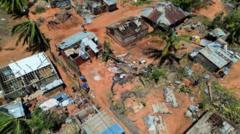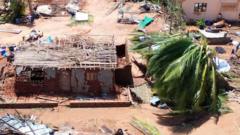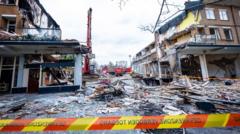At least 10 individuals have been reported dead following the eruption of Mount Lewotobi Laki-laki in eastern Indonesia on Sunday, marking one of the most severe volcanic events in the region in recent weeks. According to officials, the eruption lasted over 24 minutes and led to a plume of smoke reaching as high as 300 meters by Monday morning. The Indonesia's Center for Volcanology and Geological Hazard Mitigation has reported that the volcano has exhibited heightened activity, erupting 43 times since late October.
At Least 10 Confirmed Fatalities as Mount Lewotobi Laki-laki Erupts in Indonesia

At Least 10 Confirmed Fatalities as Mount Lewotobi Laki-laki Erupts in Indonesia
A devastating eruption in eastern Indonesia has resulted in multiple fatalities and significant evacuations, as authorities brace for further volcanic activity.
The National Agency for Disaster Management confirmed that nine bodies had been recovered, although one individual remains missing and is believed to be trapped beneath rubble. The eruption has detrimentally impacted over seven villages, displacing thousands and prompting residents to seek refuge in safer areas, as authorities advised a no-go zone extending more than seven kilometers from the volcano's crater. Local officials are preparing for a potential increase in seismic activity, with warnings of additional earthquakes expected in the following days.
Situated on the Pacific "Ring of Fire," Indonesia experiences frequent volcanic eruptions and earthquakes due to tectonic plate movements. Historically, the country has witnessed some of the world's deadly eruptions, including the eruption of Mount Marapi last year, which claimed over 20 lives.
Volcanology experts, including Muhammad Wafid of Indonesia’s Geological Agency, noted a “significant increase” in activity at Mount Lewotobi Laki-laki in recent days, raising concerns among officials and residents alike. As search and recovery efforts continue, the Indonesian government is closely monitoring the situation to ensure public safety and mitigate further risks associated with this natural disaster.
Situated on the Pacific "Ring of Fire," Indonesia experiences frequent volcanic eruptions and earthquakes due to tectonic plate movements. Historically, the country has witnessed some of the world's deadly eruptions, including the eruption of Mount Marapi last year, which claimed over 20 lives.
Volcanology experts, including Muhammad Wafid of Indonesia’s Geological Agency, noted a “significant increase” in activity at Mount Lewotobi Laki-laki in recent days, raising concerns among officials and residents alike. As search and recovery efforts continue, the Indonesian government is closely monitoring the situation to ensure public safety and mitigate further risks associated with this natural disaster.






















